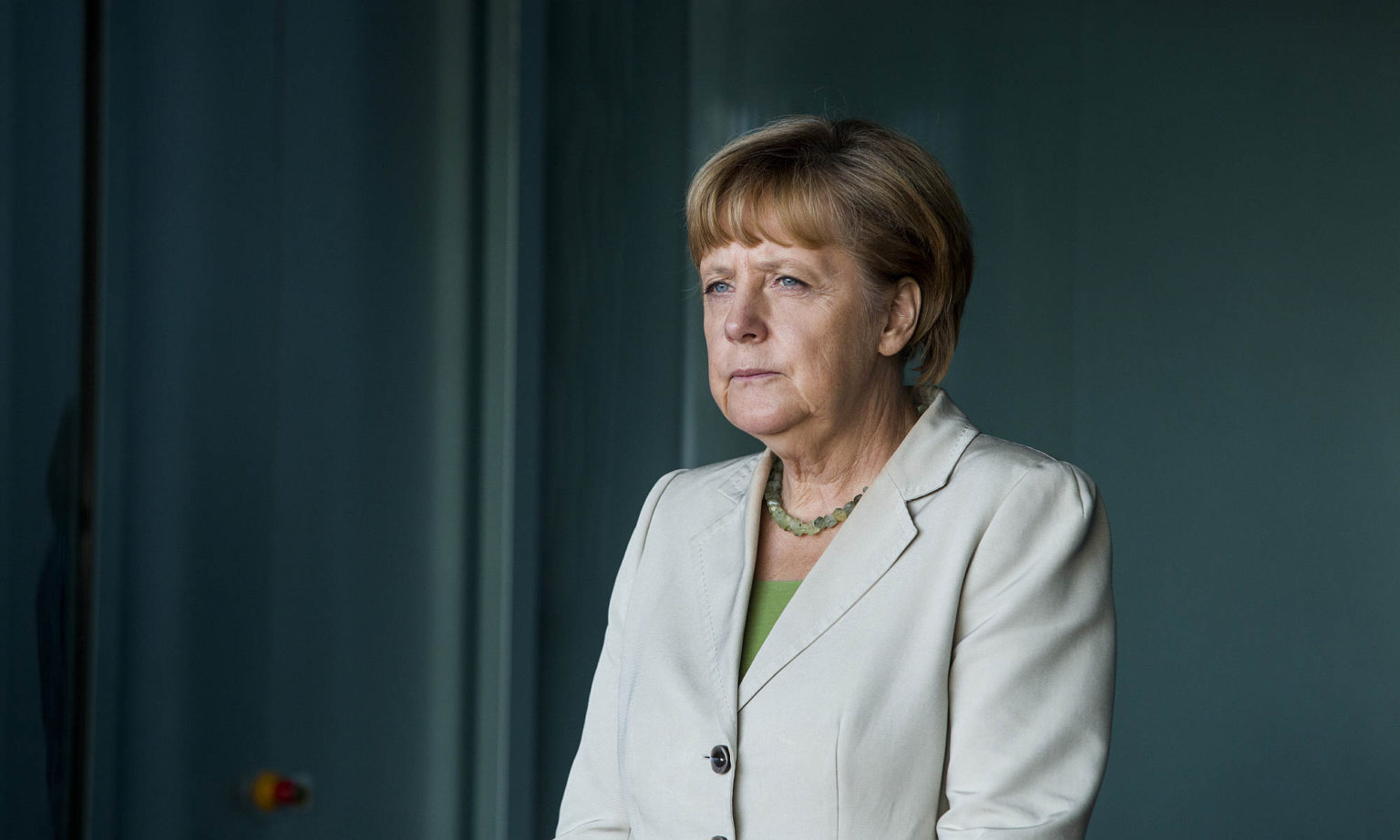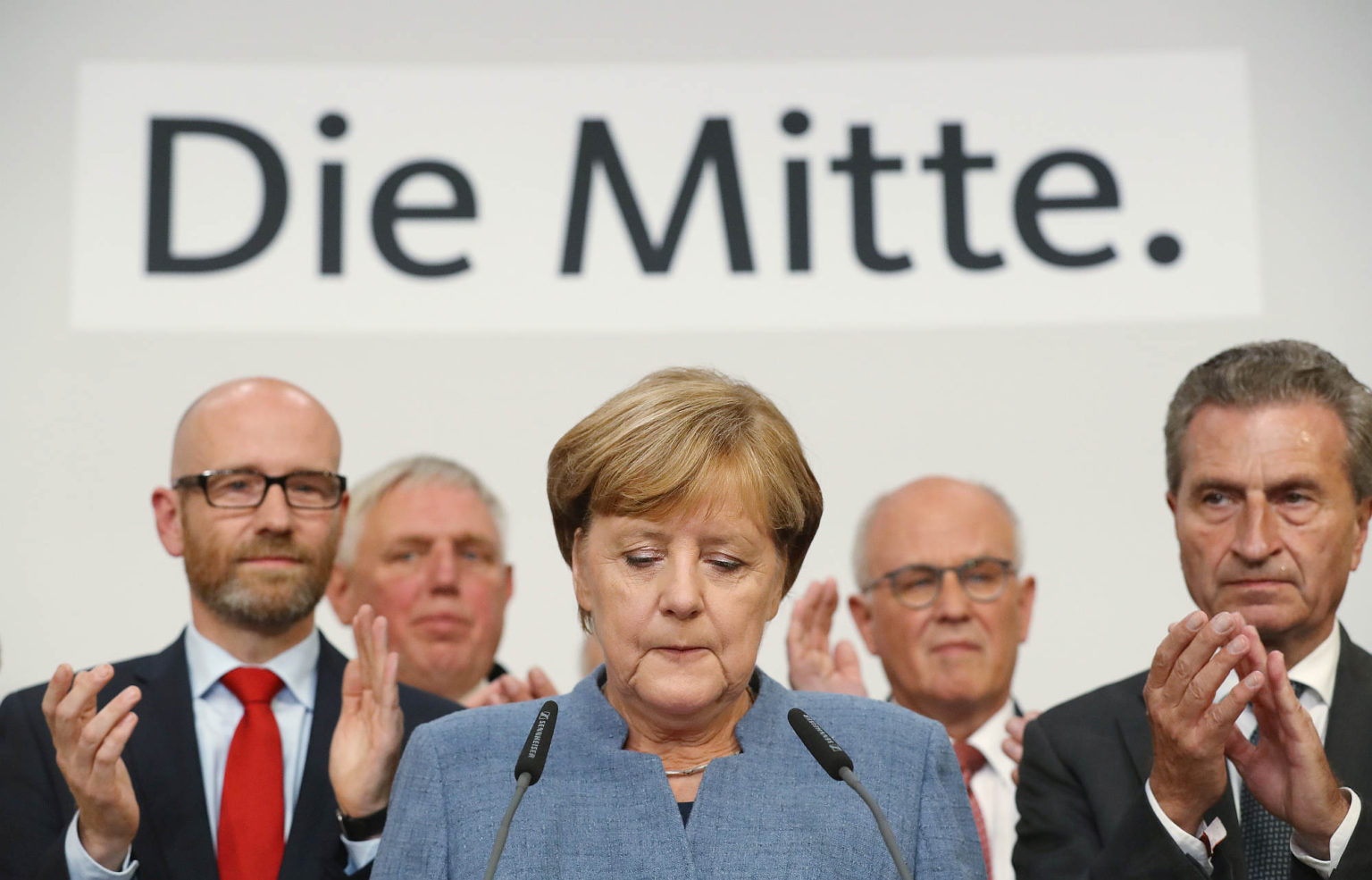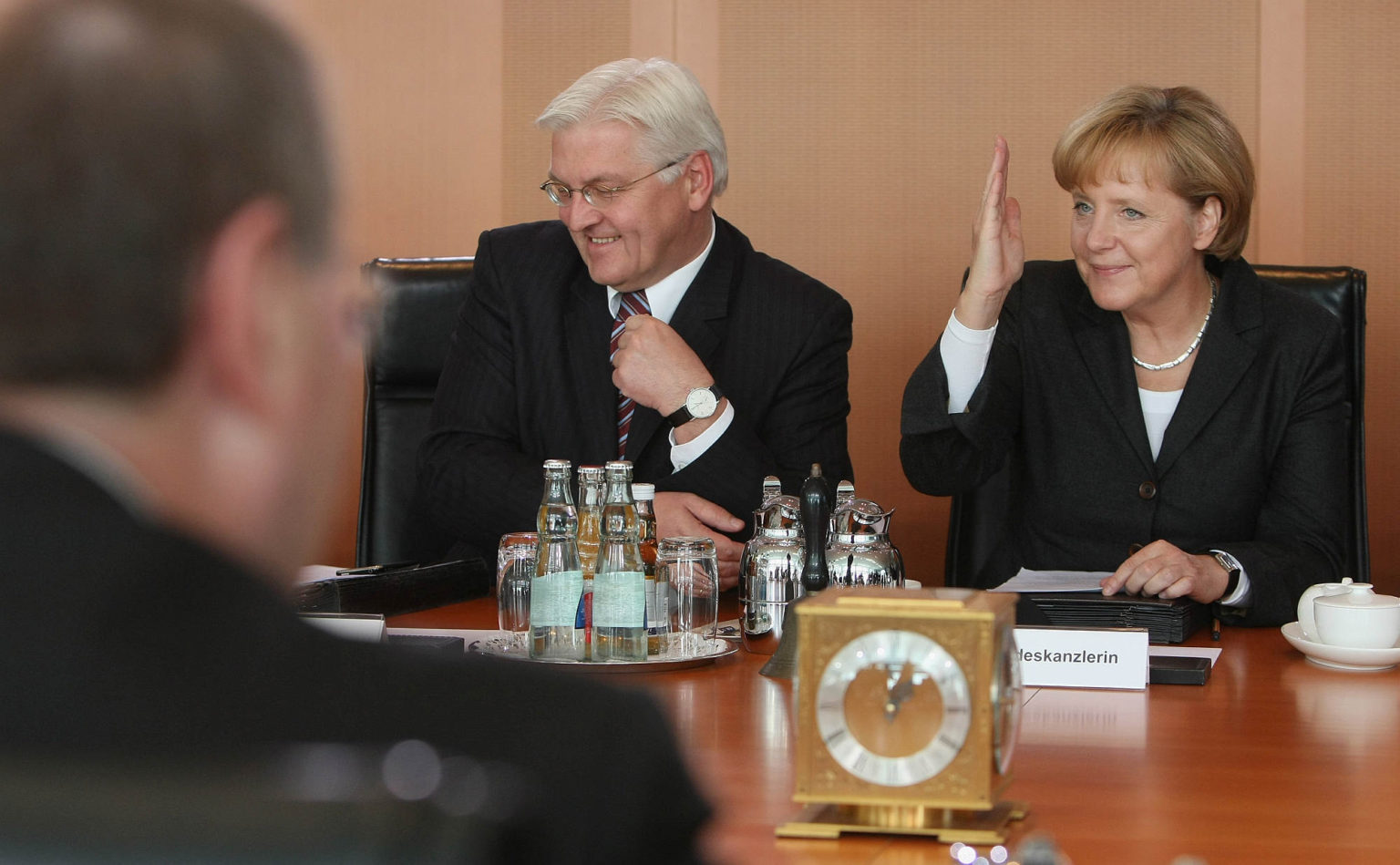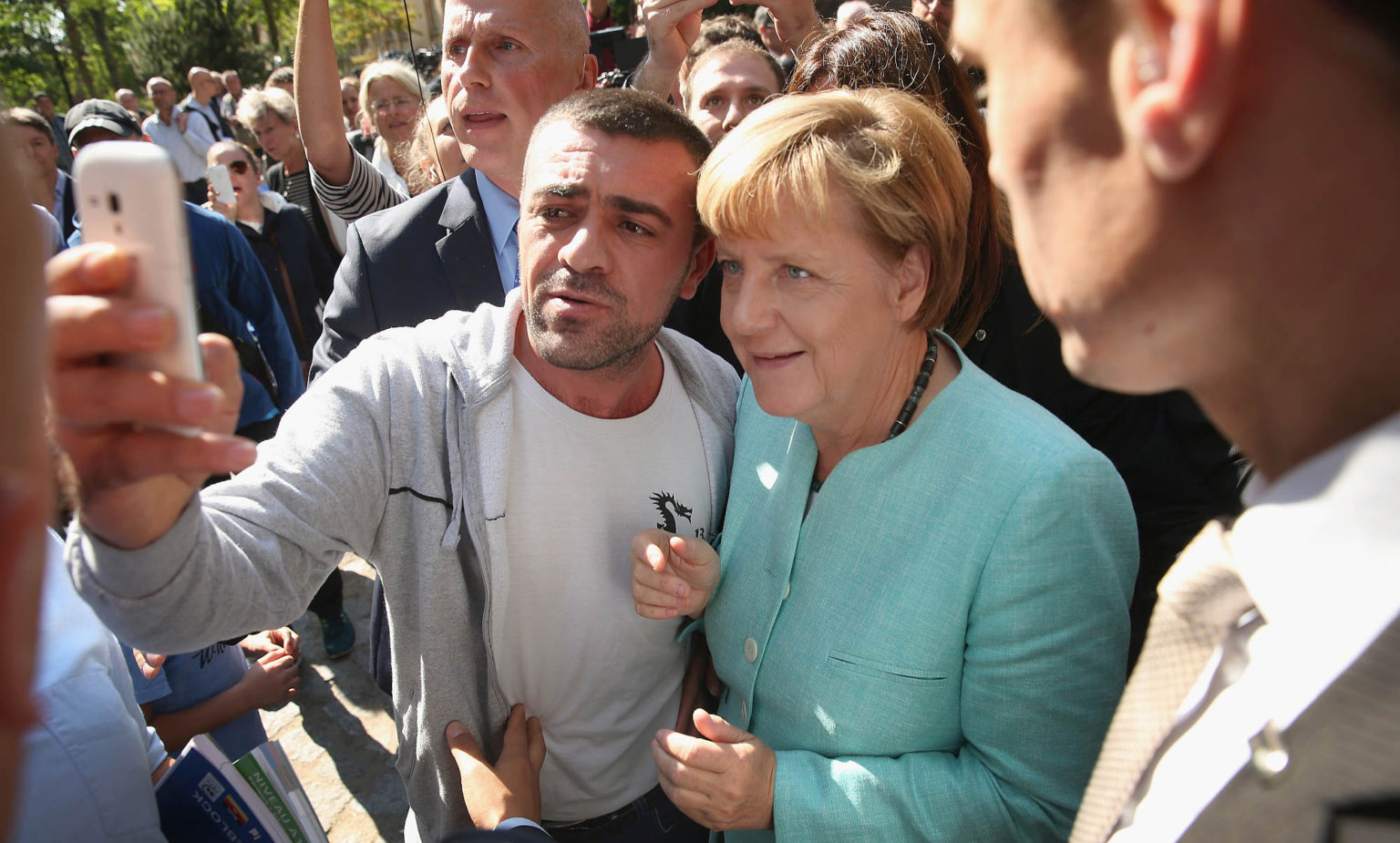
Long-read
The myth of Angela Merkel
She was never a great leader – and she has left Germany weakened.
Want to read spiked ad-free? Become a spiked supporter.
At the height of Angela Merkel’s powers, the outgoing German chancellor was hailed as the leader of the free world – the supreme defender of the liberal order in an age of populism, and the saviour of Europe in an age of nationalist revanchism. But as Merkel exits the stage, after 16 years at the helm of Europe’s largest and most prosperous nation, the commentary has been much more muted. Hagiographies of her years in power are few and far between. Could the myth of Merkel finally be starting to unravel?
There is no question that Merkel is a formidable politician. Her 16-year reign makes her one of Germany’s longest-serving chancellors, placing her alongside the likes of Otto von Bismarck and Helmut Kohl. But while Merkel’s staying power, her dominance, her supreme talent for self-preservation may have served her well, she leaves her party, her country and Europe in a weakened state.
Merkel is, above all, an opportunist. She is a politician who has moved with the times, who has ably outmanoeuvred her rivals in and outside her party. ‘Merkiavelli’ is how she was dubbed by the late sociologist Ulrich Beck. She is a political shapeshifter. On the economy, Merkel began her chancellorship as a fiscal hawk, keeping a tight grip on the budget strings for most of her time in office. She leaves office having authorised some of the most generous pandemic spending in the world. On cultural questions, she was at times a social conservative, opposing gay marriage, and other times a hyper-liberal, opening Germany’s borders to a million refugees. Merkel has no ideology beyond what works for Merkel.

And this has made it impossible for German politicians to emerge from her shadow. She has managed to dominate the German political scene to such an extent that even Germany’s first post-Merkel elections at the weekend were overshadowed by her presence. This has come at a huge cost to her party, the CDU. It is wracked by infighting and uncertainty over what direction it should go in. Its two successors to Merkel have both imploded spectacularly. First, there was ‘mini Merkel’ Annegret Kramp-Karrenbauer who lasted less than a year as CDU leader. Now there is the hapless Armin Laschet, who couldn’t manage to muster even 25 per cent of the vote in this week’s elections – the CDU’s worst-ever result. This was once the dominant party of postwar Germany. Germany has had a CDU chancellor for 57 of the 72 years of the federal republic. But Merkel has left the party a hollowed-out husk.
Even the rival Social Democrats, the SPD, cannot break free from Merkel’s mould. The SPD’s Olaf Scholz, who narrowly won the election, served as Merkel’s vice-chancellor and finance minister in coalition. During the campaign he presented himself as the continuity candidate rather than the change candidate. He even copied Merkel’s signature hand gesture – the ‘Merkel rhombus’ – to ram this message home.
But for a politician who so many are desperate to ape, and whose legacy they are so terrified to break from, Merkel’s time in office has not exactly worked wonders for the country she served.
Just look at the German economy. As Wolfgang Streeck has argued on spiked, the economic conditions Merkel inherited were incredibly favourable. Her predecessor, the SPD’s Gerhard Schröder, had brought Germany into the Euro, and had already squeezed the wages of German workers (with the connivance of the trade unions). This made German exports more competitive, even at a time when other developed countries were offshoring their manufacturing bases to the Far East. The SPD paid a heavy political price for these reforms, but Merkel gobbled up the spoils.
So what ideas did Merkel bring to the table? Not many. When she first ran for election in 2005, she presented herself as a hardline Thatcherite. She wanted a flat tax, welfare cuts, labour-market deregulation. She set herself in opposition to the German economic model – in particular, against the ‘social partnership’ that brings together the state, the private sector and labour unions – in favour of a more Anglosphere style of capitalism. But after only narrowly winning the election, and after forming a coalition with the Social Democrats, most of these plans were dropped. She discovered that she had actually loved the social partnership all along, and that her predecessors had already done the heavy lifting when it came to labour-market reforms.
Throughout much of Merkel’s time as chancellor, the German economy seemed to be in good shape. It weathered the 2008 financial crash far better than the rest of the West. Germany became a by-word for economic success, efficiency and resilience.

Yet towards the end of Merkel’s time in office, Germany’s underlying weaknesses started to come to the surface. Even before the pandemic shut down the world, Germany was teetering on the edge of recession. It grew just 0.6 per cent in 2019. Its much-vaunted industrial base has been slowly declining as a share of GDP. Even the fate of Germany’s all-powerful auto industry no longer feels so secure – 42 per cent of German car workers now say that they fear for their future. The ‘jobs miracle’ that Merkel oversaw was a mirage. Yes, more people found work, but mainly in poorly paid, low-productivity service jobs.
Under Merkel’s penny-pinching regime, the German state has failed to invest properly in infrastructure, and many of its larger construction projects have been beset by delays, cost overruns and corruption. Berlin’s newest airport, Berlin Brandenburg, is emblematic of Germany’s infrastructure woes. It took nine years longer to build than planned, and missed seven of its slated opening dates.
Even worse has been the failure to upgrade Germany’s digital infrastructure – Germany has some of the slowest internet speeds in the developed world, and the worst 4G coverage in Europe. Four in 10 companies are still using fax machines. Merkel’s Germany is no model of ‘efficiency’.
One area in which she promised major reform was in energy production. Germany has long had a reputation for being ‘green’ and for taking climate change seriously. In 2010 the government initiated the Energiewende – the ‘energy transition’ to low-carbon sources like wind and solar. But one major fault in the plan was that it also included the decommissioning of Germany’s nuclear power plants, despite the fact that nuclear power generation is carbon-neutral. The government had planned to use nuclear as a ‘bridging technology’, keeping plants online until the point at which renewables would be able to provide 100 per cent of energy. But panic struck following the meltdown at the Fukushima Daiichi nuclear plant in Japan. Suddenly, nuclear was declared unsafe, and its removal from Germany’s energy mix was made a priority. In reality, the Fukushima crisis was caused by a tsunami. It had nothing to do with nuclear safety. Nevertheless, Germany’s last nuclear plant will shut down next year.
Relying on renewable energy was always a fantasy. Wind farms and solar panels are expensive, unreliable and take up vast chunks of the landscape. Many of the construction projects have been met with fierce local opposition. And when the wind doesn’t blow or the sun doesn’t shine, other sources of energy have to be brought in. Now that nuclear is out of the picture, Germany has to turn instead to much more polluting energy sources like coal. The end result is that Merkel’s green policies have left Germany with the highest carbon emissions per head in Europe – and some of its highest electricity prices.
Merkel’s most radical move in office was her decision to open Germany’s borders to Syrian refugees in 2015. Arguably, this was the moment when the charisma-free chancellor became a darling of the global liberal commentariat. She was hailed for her humanitarianism. As other countries wanted to pull up the drawbridge, to turn their backs on human suffering, Merkel declared, in a somewhat understated fashion, ‘We’ll manage’ (Wir schaffen das). Germany has, by and large, ‘managed’ though Merkel never articulated much of a plan as to how to do it. She also made the decision over the heads of German voters – who never really got a say in the matter.

In the months and years since the refugee crisis, though it seems to have always eluded the media spotlight, Merkel has busied herself with tightening up the borders once more. The German government has ramped up deportations and signed new repatriation agreements with countries like Afghanistan. Most controversially, Merkel spearheaded an EU migration deal with Turkey, paying the Turkish government €6 billion to host millions of illegal immigrants.
The refugee policy also provoked an enormous political backlash. The right-wing Alternative for Germany party (AfD) was given rocket boosters. After the 2017 elections, when Merkel scored the lowest-ever vote share for a sitting chancellor, the AfD became the largest opposition party. It has slumped since then, but it has nonetheless established itself as a feature of the German political landscape. The shockwaves from Merkel’s refugee policy reverberated throughout Europe, too. The borders are now back up and are more fiercely guarded than ever. As Merkel leaves office, the EU – or ‘Fortress Europe’ as it is sometimes nicknamed – has some of the most militarised borders in the world.
While Merkel muddled through domestically, on the European stage she played a truly destructive role. Yes, she helped to ‘save’ the Euro after the debt crisis. But at what cost? Germany – alongside the ‘Troika’ of the IMF, the EU and the ECB – insisted that the only solution to the crisis was brutal, punishing austerity. Public-sector employment was slashed by 30 per cent. At the worst point of the crisis, Greece lost more than a quarter of its entire GDP. Unemployment climbed by 16 percentage points and youth unemployment peaked at around 56 per cent. Italy took the second-biggest hit after Greece. Neither country’s GDP has ever recovered to its pre-crisis level. The Euro was saved, but not Europe.
Yet towards the end of Merkel’s time in office, this strict fiscal rectitude went by the wayside – in Germany at least. In response to the pandemic, quite understandably, Merkel’s government turned on the spending taps to meet the demands of an unprecedented economic shock. So far, Germany has spent over €1 trillion on keeping the economy afloat during the Covid crisis – nearly twice as much as Britain. The ‘German model’ of fiscal rules, which was deemed so necessary to deal with the Euro crisis, was quickly shelved when a major economic crisis hit Germany. Austerity for thee, but not for me.
The ‘myth’ of Angela Merkel is that she has brought maturity and stability to Germany and to Europe. Her defenders would call her lack of guiding principles pragmatism. But it is really opportunism. She has chased the opinion polls and changed tack accordingly. And on many occasions, Merkel has given in to outright panic – as the denuclearisation policy best illustrates.
The hollowness of Merkel is not a virtue. Her lack of principle, her lack of an agenda, has left Germany unprepared for many of the great challenges of the 21st century.
Fraser Myers is deputy editor at spiked and host of the spiked podcast. Follow him on Twitter: @FraserMyers.
Pictures by: Getty
Celebrate 25 years of spiked!
A media ecosystem dominated by a handful of billionaire owners, bad actors spreading disinformation online and the rich and powerful trying to stop us publishing stories. But we have you on our side. help to fund our journalism and those who choose All-access digital enjoy exclusive extras:
- Unlimited articles in our app and ad-free reading on all devices
- Exclusive newsletter and far fewer asks for support
- Full access to the Guardian Feast app
If you can, please support us on a monthly basis and make a big impact in support of open, independent journalism. Thank you.







Comments
Want to join the conversation?
Only spiked supporters and patrons, who donate regularly to us, can comment on our articles.